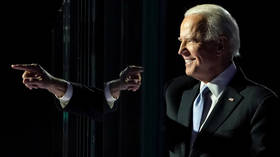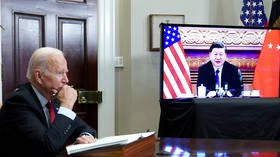Biden’s Democracy Summit lacks one very crucial thing

This week’s virtual Summit for Democracy, which will be hosted by US President Joe Biden, is likely to become yet another public relations stunt, with the accompanying fanfare of self-righteous zealotry and imperial narcissism.
One may ask whether this ‘summit,’ scheduled for December 9 and 10, is necessary and timely, and whether it will have added value. Observers have expressed cautious skepticism, precisely because this gathering takes a binary approach and starts by dividing the world into “us” and “them,” excluding billions of human beings and assuming that the ‘good guys’ can now show the ‘bad guys’ what democracy is all about.
As UN Independent Expert on International Order (2012-18), I frequently explored facets of domestic and international democracy, as well as the various models of direct, semi-direct, participatory and representative democracy. I noted that representative or deliberative democracy is experiencing a crisis of legitimacy, because there is a growing disconnect between representatives and the electorate. There is a risk that democracy itself may become collateral damage of the credibility crisis resulting from the phenomenon of fake news, fake history, fake law and fake diplomacy. I insisted on the need to return to the true meaning of democracy as rule of, by, and for the people, i.e. people-power in practice.
It is opportune to recall the Outcome Document of the truly inclusive World Summit of 2005, held to commemorate 60 years since the entry into force of the UN Charter on 24 October 1945. In the spirit of the Charter, which is akin to a world constitution, the General Assembly unanimously adopted Resolution 60/1 reaffirming “that democracy is a universal value based on the freely expressed will of people to determine their own political, economic, social and cultural systems and their full participation in all aspects of their lives.”
In other words, democracy is another term for the right of self-determination of all peoples, as stipulated in article 1 common to the International Covenant on Civil and Political Rights, and Covenant on Economic, Social and Cultural Rights. The General Assembly went on to reaffirm that “while democracies share common features, there is no single model of democracy, that it does not belong to any country or region.” There is no patent on democracy, no “one size fits all.” In light of the above, one may ask whether the premise of the “Summit for Democracy” is in tune with the “necessity of due respect for sovereignty.”
With regard to international democracy, in my 14 reports to the Human Rights Council and General Assembly and in my book Building a Just World Order (Clarity Press, 2021), I urged concrete reforms to the functioning of the UN, including reforms of the Security Council and the exercise of the veto power. More importantly, I insisted on the necessity of ensuring equitable participation of all states in the noble tasks of the UN and its associated agencies, including the World Health Organization, ILO, UNESCO, WTO, the World Bank and the International Monetary Fund. Furthermore I endorsed the idea of establishing a World Parliamentary Assembly with consultative status, a proposal enthusiastically supported by the late Secretary-General Boutros Boutros-Ghali, who stated: “The establishment of a Parliamentary Assembly at the United Nations has become an indispensable step to achieve democratic control of globalization. Complementary to international democracy among states, which no less has to be developed, it would foster global democracy beyond states, giving the citizens a genuine voice in world affairs.”
Let us be optimistic and hope that President Biden’s 2021 summit will give room to the spirit of international solidarity and provide an opportunity to revisit the functioning of democracy in many participating countries including the US, UK, France, Germany, Italy, Spain, Australia, Japan, with a view to making concrete improvements. Indeed, a measure of self-criticism would be very welcome for all concerned.
For instance, Biden’s summit could address the following pressing concerns:
- How to bridge the disconnect between nominally “democratic” governments and their electorates
- How to give the electorate genuine policy choices and not just the opportunity of voting for candidate A or candidate B, when both essentially agree on issues that urgently require change
- How to ensure that the public has access to all information and pluralistic views, so as to enable them to make their own choices
- How to phase-out media conglomerates that censor and disseminate fake news in order to “manufacture consent,” as Noam Chomsky called it? Anti-monopoly and anti-trust legislation may prove useful in this context.
- How to make transparency and accountability by governments more than just a slogan
- How to render periodic elections more than just pro forma rituals
- How to protect the rights of journalists and whistleblowers like Julian Assange
- How to give more visibility to “unsung victims,” including the largely disenfranchised indigenous peoples of North and South America, the Crees, Sioux, Navajo, and Mapuche
Two issues are of particular relevance to the proper functioning of American democracy, one being the undemocratic nature of the “electoral college” and another the endemic practice of gerrymandering. Surely these two problems should be tackled – better sooner than later.
If the Biden Summit conscientiously explores these issues, maybe there will be “added value” to the exercise. And perhaps the gathering will embrace and act upon the conclusion of the 2005 World Summit that “democracy, development and respect for all human rights and fundamental freedoms are interdependent and mutually reinforcing.”
Biden should strive for detente as the best environment for domestic and international democracy. He should stop provoking the world by imposing sanctions right and left and boycotting the Beijing Olympics.
Let us wish the Biden summit success, that it may rise above platitudes and accept the simple fact that democracy is much more than periodic elections, that it means informing the people on all issues and proactively consulting them, so that they can genuinely participate in the conduct of public affairs. The peoples of all countries – invitees and non-invitees – share the same aspiration to enjoy peace and prosperity in freedom.
In this spirit, states should renew their commitment to support democracy by strengthening countries’ capacities to implement the principles and practices of democracy and resolve to strengthen the capacity of the UN to assist Member States upon their request.
The statements, views and opinions expressed in this column are solely those of the author and do not necessarily represent those of RT.















